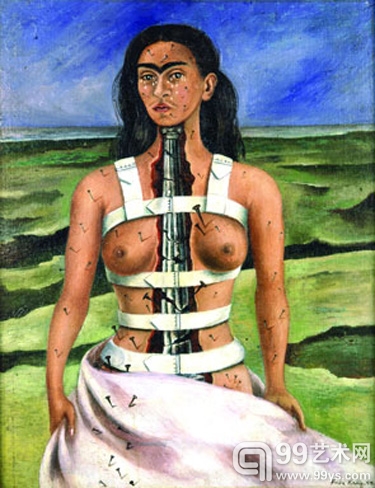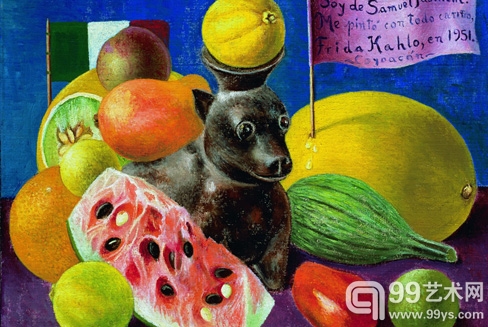|
從4月30開(kāi)始,一直到8與人9日,柏林Martin-Gropius-Bau美術(shù)館將舉辦規(guī)模最大的墨西哥女藝術(shù)家弗里達(dá)(Frida
Kahlo)的回顧展。

弗里達(dá)The Broken Column1944
從4月30開(kāi)始,一直到8與人9日,柏林Martin-Gropius-Bau美術(shù)館將舉辦規(guī)模最大的墨西哥女藝術(shù)家弗里達(dá)(Frida
Kahlo)的回顧展。
弗里達(dá)出生于墨西哥的Coyoacán,是拉丁美洲最收關(guān)注的藝術(shù)家之一,她也是20世紀(jì)上半葉最為著名的女藝術(shù)家。
弗里達(dá)在1925年9月17日遭遇一次車禍,在其之后的人生中,弗里達(dá)都遭受著不斷手術(shù)帶來(lái)的結(jié)果,這一深刻的經(jīng)歷在藝術(shù)家的作品和她的世界中都留下深刻的烙印。
這次柏林Martin-Gropius-Bau美術(shù)館的展覽由150件作品構(gòu)成,其中包括油畫和素描,是弗里達(dá)到目前為止最全面的個(gè)展。弗里達(dá)作品的兩大收藏機(jī)構(gòu)第一次聯(lián)手展出藝術(shù)家的作品,而來(lái)自30個(gè)墨西哥機(jī)構(gòu)和15個(gè)北美美術(shù)館和私人收藏的作品無(wú)疑更加增加了這次展覽的分量。
從4月30開(kāi)始,一直到8與人9日,柏林Martin-Gropius-Bau美術(shù)館將舉辦規(guī)模最大的墨西哥女藝術(shù)家弗里達(dá)(Frida
Kahlo)的回顧展。

弗里達(dá)靜物 私人收藏 1951年
Most Comprehensive Show of Frida Kahlo's Work Ever
Staged Opens in Berlin
From 30 April to 9 August 2010 Berlin’s Martin-Gropius-Bau
will be devoting an extensive retrospective to the important
Mexican artist Frida Kahlo.
Born in Coyoacán, Mexico City, Frida Kahlo is one of the great
identification figures of Latin American art. She stands out as one
of the most famous female artists of the first half of the 20th
century.
Injured in a traffic accident on 17 September 1925 Frida Kahlo
spent the rest of her life in pain as a consequence of her frequent
operations. These profound experiences left their mark on her work
and her world. Her acquaintanceships with such prominent figures of
her day as Leon Trotsky, Andr Breton or Nicholas Murray influenced
her eventful life. In 1929 she married the famous Mexican muralist
Diego Rivera, who supported her in her artistic career.
Frida Kahlo’s works refer back to the early art of Mexico,
that of the Aztecs and the Mayas, reflecting the social, political,
and above all private aspects of her life. In 1938 /39 she had very
successful one-person exhibitions in both New York and Paris. Later
she was given a chair at the Mexican Ministry of Education’s School
of Painting and Sculpture, known as “La Esmeralda”. She taught
mural and easel painting, receiving the National Art Prize. She was
able to sustain her teaching activities for some years before poor
health forced her to abandon them.
The exhibition
The exhibition in the Martin-Gropius-Bau, curated by the art
historian Helga Prignitz-Poda, will consist of about 150 works
(paintings and drawings), making it the most comprehensive show of
Frida Kahlo’s work ever staged. For the first time the two largest
Kahlo collections will be on display in toto and together. To these
must be added valuable loans from 30 Mexican and 15 North American
museums and private collections.
Frida Kahlo’s artistic development from the New Objectivity
(Neue Sachlichkeit) through Mexican Estridentism – an avant garde,
interdisciplinary artistic movement that arose out of the Mexican
Revolution – to Surrealism and her very own brand of realism, will
be comprehensively presented. In addition to the famous paintings,
works by Kahlo that are largely unknown or were believed to be lost
will be on show. A particular highlight will be a collection of
about 90 drawings, some previously unpublished, and her last works
dating from 1954: The self-portrait in oils as a sunflower – a work
previously believed to have been destroyed – and the self-portrait
drawing will be seen in Europe for the first time. The drawings
with surreal compositions reveal a hitherto undiscovered side of
Frida Kahlo: her humour. These light-hearted and subtle verbal and
visual puns at once conceal and express her thoughts.
Another section of the exhibition will be devoted to the
small-format votive paintings which the artist executed in the
Mexican ex voto style in the early 1930s. They express the artist’s
yearnings for health, independence and fulfilment.
|